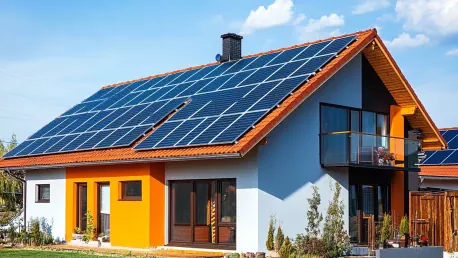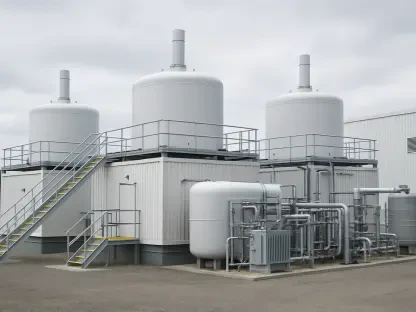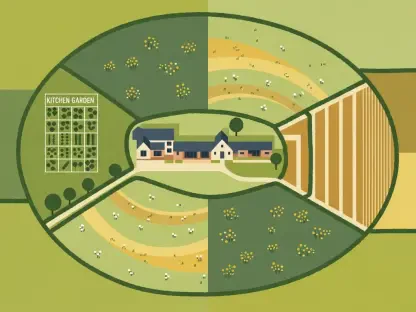Green technology innovations are playing a pivotal role in transforming various industries and contributing to a cleaner, more sustainable planet. These advancements are not only mitigating environmental destruction but also promoting sustainable growth across multiple sectors. As we witness rapid development in this domain, the importance of green tech becomes increasingly apparent, particularly in addressing challenges like climate change, resource depletion, and pollution. These technologies encompass a range of solutions from renewable energy systems to sustainable agriculture, each offering promising possibilities for a more eco-friendly future.
The Rise of Solar Power
Solar power has emerged as a prominent beacon of renewable energy, with significant advancements in photovoltaic cells, particularly perovskite solar panels drastically improving efficiency and reducing costs. These innovations make solar power more accessible and practical for both residential and industrial applications, fostering a widespread shift from fossil fuels to renewable energy sources. The expansion of solar power into industrial applications is groundbreaking, allowing broader adoption of renewable energy. This shift is essential for reducing greenhouse gas emissions and promoting a sustainable energy future as solar technology continues to evolve and demonstrate its transformative potential.
The accessibility and practicality of solar power are crucial for its adoption on a larger scale. Simplified installation processes, improved energy storage solutions, and financial incentives enhance the attractiveness of solar energy. As corporations and governments invest in solar infrastructure, we are entering an era where solar energy could become the norm rather than the exception. The increased market competitiveness of solar power further underscores its potential to revolutionize the energy sector, driving us toward a future less reliant on fossil fuels and more sustainable overall.
Wind Energy Innovations
Wind energy has seen explosive growth driven by technological advances aimed at maximizing turbine efficiency. Offshore wind farms capture stronger and more consistent winds, providing a reliable source of clean energy. The development of vertical-axis and bladeless wind turbines presents compact and less obtrusive alternatives, making wind energy feasible in urban settings. These innovations reduce greenhouse gas emissions and offer clean energy at competitive costs, underscoring the transformative potential of green technology in the energy sector.
The increasing popularity of wind energy is a testament to its reliability and efficiency. As technology advances, the cost-effectiveness of wind energy improves, making it an attractive option for both public and private energy projects. By integrating wind energy into the power grid, we’re taking significant strides toward a sustainable energy future. Wind energy’s adaptability to various environments, from open seas to bustling cities, illustrates its versatility and scalability, further solidifying its role in our transition to renewable energy sources.
Green Building Technologies
Green building technologies are revolutionizing the construction industry, focusing on minimizing environmental impacts associated with construction and operation. Smart energy management systems, water recycling setups, and green construction materials, such as bamboo and recycled steel, are gaining popularity. The concept of net-zero energy buildings, which produce as much energy as they consume, is becoming widely accepted. These buildings utilize IoT devices to optimize energy usage, reduce waste, and foster healthier living environments, highlighting the role of green technology in transforming the construction industry.
The adoption of green building technologies signifies a crucial shift towards sustainability. By incorporating smart systems and sustainable materials, buildings can significantly reduce energy consumption and carbon footprints. This not only leads to cost savings in the long run but also contributes to overall environmental health. As urbanization increases, the implementation of green building practices will become increasingly vital in ensuring cities are both livable and sustainable. The evolution of green building technologies promises a future where construction and environmental conservation go hand in hand.
The Electric Vehicle Revolution
Electric vehicles (EVs) stand as a significant pillar in the green technology revolution, transitioning from niche markets to a global movement. Improvements in battery technology, including the development of solid-state batteries, have enhanced the economic and functional viability of EVs, making them more efficient and sustainable. The emergence of Vehicle-to-Grid (V2G) technology allows EVs to serve as energy storage units, stabilizing power grids. With major automobile manufacturers announcing the end of internal combustion engines, EVs are poised to dominate the transportation sector.
The shift towards EVs is critical for reducing greenhouse gas emissions and promoting sustainable transportation. Advances in charging infrastructure, coupled with government incentives, are driving consumer adoption and making EVs more accessible. As technology progresses, the range and affordability of EVs continue to improve, further encouraging the transition. The revolution in electric vehicles signifies a fundamental change in our approach to transportation, paving the way for a future where mobility is not only efficient but also environmentally friendly.
Carbon Capture and Storage
Carbon capture and storage (CCS) technologies represent innovative solutions in the fight against climate change by capturing carbon dioxide emissions from industrial processes and storing them underground. Direct air capture (DAC) takes CCS a step further by directly capturing CO₂ from the atmosphere, providing a crucial tool for reducing atmospheric carbon levels. Industries such as energy and manufacturing are actively exploring CCS to meet stringent carbon-reduction targets. These technologies play a pivotal role in mitigating climate change and highlight the transformative potential of green tech.
The pursuit of carbon-neutral practices is driving the adoption of CCS technologies. By capturing and storing carbon emissions, industries can significantly decrease their environmental impact while adhering to regulatory standards. The scalability of CCS solutions allows for widespread implementation across various sectors, underscoring their importance in achieving global climate goals. As research and development in this area continue, CCS is poised to become a cornerstone of efforts to combat climate change, demonstrating the far-reaching capabilities of green technology.
Sustainable Agriculture
Sustainable agriculture is undergoing significant transformation through the integration of green technology. Precision farming, supported by AI and IoT, helps farmers optimize resource usage by analyzing soil health, weather patterns, and crop requirements. Practices like hydroponic and vertical farming offer urban farming solutions, enabling crop production in controlled indoor environments. Innovations such as lab-grown meats and plant-based proteins aim to reduce the environmental footprint of food production, showcasing the potential of green technology to promote sustainable agriculture and ensure future food security.
The advancements in sustainable agriculture are essential for addressing the growing demands of a rising global population. By leveraging technology, farmers can increase efficiency, reduce waste, and enhance crop yield, leading to a more resilient and sustainable food system. Urban farming, lab-grown meats, and precision agriculture represent forward-thinking approaches that not only meet current needs but also anticipate future challenges. These innovative methods promise to revolutionize the agricultural sector, aligning food production with environmental conservation goals.
Waste Management and Recycling
Waste management and recycling technologies are integral components of the green technology landscape. Modern recycling techniques break down plastics into raw materials, facilitating infinite reutilization. AI-powered smart bins distinguish between types of waste, promoting efficient recycling practices. Companies are exploring upcycling—transforming waste into products of greater value—contributing to a circular economy. The adoption of advanced waste management and recycling technologies is crucial for reducing environmental impact and promoting a sustainable future.
Efficient waste management and recycling practices address some of the most pressing environmental issues, including plastic pollution and landfill overuse. By embracing innovative technologies, we can transform waste into valuable resources, significantly minimizing our ecological footprint. The concept of a circular economy encourages sustainable consumption and production patterns, fostering a culture of reusability and environmental responsibility. The continued development and application of these technologies are fundamental to achieving a cleaner, more sustainable world.
The Promise of Green Hydrogen
Green hydrogen emerges as a promising energy source fueled by renewable energy. Its versatility allows usage in power generation, industrial applications, and as fuel for hydrogen-powered vehicles. Significant global investments in green hydrogen infrastructure reflect its potential in decarbonizing sectors like aviation and shipping, demonstrating the crucial role of green hydrogen in promoting a sustainable energy future and reducing reliance on fossil fuels.
The promise of green hydrogen lies in its ability to replace conventional fuels with a cleaner alternative. As technology and infrastructure develop, the production and distribution of green hydrogen will become more efficient and widespread. This shift is essential for sectors that are challenging to electrify, such as heavy industry and long-haul transportation. Green hydrogen’s potential to cut carbon emissions across various industries illustrates its transformative power, paving the way for a future dominated by clean energy solutions.
Marine and Ocean Technologies
Marine and ocean technologies are pivotal in conserving marine ecosystems and capturing renewable energy. Innovations like floating solar farms and tidal energy generators offer sustainable energy solutions with minimal environmental disruption. Marine drones and underwater robots are employed for monitoring ocean health, biodiversity mapping, and pollution tracking. These technologies ensure the sustainability of marine environments and underscore the role of green tech in promoting environmental conservation and sustainable development.
The health of our oceans is vital to overall ecological balance and biodiversity. By employing advanced technologies, we can monitor and protect marine environments more effectively, preserving them for future generations. Renewable energy solutions that harness the power of the sea contribute significantly to our transition away from fossil fuels. These innovative approaches demonstrate the diverse applications of green technology, highlighting its potential to address environmental challenges comprehensively.
The Development of Biodegradable Materials
Green technology innovations are crucial in revolutionizing various industries and fostering a cleaner, more sustainable planet. These advancements not only curb environmental degradation but also drive sustainable growth across different sectors. As developments in green technology quickly evolve, their significance in tackling pressing issues such as climate change, resource depletion, and pollution becomes even more evident. Green tech solutions span a wide array of areas, from renewable energy systems to sustainable agriculture, each offering potential for a more eco-friendly future. Renewable energy technologies, like solar and wind power, reduce dependence on fossil fuels and lower greenhouse gas emissions. In agriculture, methods such as precision farming and organic practices minimize environmental impact while enhancing crop yields. Green tech also includes innovations in water management, waste reduction, and energy efficiency, all aimed at creating a more sustainable world. As these technologies continue to advance, they offer hope in solving global environmental challenges and achieving long-term sustainability goals.









